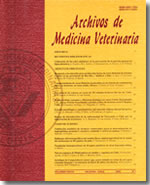Serum concentrations of triiodothyronine, thyroxine and lipid profile in dairy cows fed with a low selenium diet
Main Article Content
Abstract
The aim of this study was to evaluate the effect of a low Selenium diet and its supplementation on the serum levels of T3, T4 and on the lipid profile in dairy cows under an induced oxidative stress. Twelve pregnant dairy Chilean-Friesian cows were selected and assigned to one of two groups, control (n = 6, Se-D) and treated (n = 6, Se-S) with barium selenate (BaSe04), both receiving a Selenium-deficient diet (based on a 0.03 ppm Se-content of the DM in the diet before calving, and 0.05 ppm after calving) and oxidized tallow (0.5 kg/cow/day). The Se-S group was supplemented with selenium (1 mg/kg) in the form of BaSe04 (1 mL/50 kg, s.c). Prior to the supplementation and every 15 days, heparinized blood and plain blood samples were taken by venous puncture. The blood activity of glutathione peroxidase (GSH-Px, EC 1.15.1.9) was evaluated, also the serum concentrations of T3, T4, total cholesterol, lipoproteins (HDL, LDL and VLDL) and triacylglycerols (TAG). The differences were settled by means of a PROC MIXED of SAS, and the option REPEATED, significance was set at P < 0.05. The Se-supplementation with BaSe04 did not produce changes in the milk yield (P > 0.05), and the blood activity of GSH-Px was higher in the group Se-S starting 45 days after supplementation (P < 0.05), while the activity in the group Se-D was lower along the study (P < 0.05). There were no differences for T3 and T4 (P > 0.05). Serum concentration of cholesterol, LDL, VLDL and TAG were similar between groups (P > 0.05), there was a tendency to a higher concentration of HDL in the non-supplemented group (P = 0.047). The results suggested that a low Se-diet does not induce changes in either the thyroid function or the serum concentration of cholesterol and lipoproteins, except for the concentration of HDL, being further studies in dairy cows necessary.

